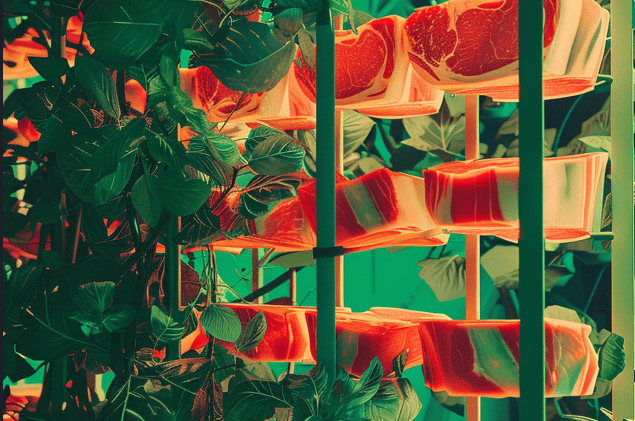
A lab-grown piece of fish on your plate, or ‘chicken breast’ made from special fungi. These are promising alternatives in a world where traditional meat and fish are increasingly under discussion. Reporter Elcke Vels visited Berlin start-ups Bluu Seafood and Bosque Foods: pioneers in the food industry.
Why you need to know this:
Slowly but surely, the world is moving towards a food sector with zero environmental impact. Bluu Seafood and Bosque Foods are contributing to this progress.
In the coming years, the world faces a significant challenge: the growth of the global population. According to United Nations projections, the population will cross the nine billion mark by 2050. Feeding nine billion mouths puts great pressure on the food industry and significantly depletes resources such as arable land, water and energy.
At the same time, more and more sustainable alternatives to conventional meat and fish consumption are being developed. Berlin is buzzing with innovative start-ups working on these. So I grabbed my coat and set out.
Lab-grown fish
Bluu Seafood is developing lab-grown fish. It is an innovative answer to the problems surrounding overfishing, the contamination of fish filets with heavy metals and microplastics, and animal cruelty.
At the Berlin office, I am welcomed by Cornelius Lahme. He is responsible for marketing and communications at the company. Although Bluu has 35 employees, it is suspiciously quiet in the office. As Lahme brews me a cup of coffee – with milk, without sugar – I ask him. Then I ask where the rest of his team is. “Everyone has been busy moving from Lübeck to Hamburg.” Indeed, Bluu is leveling up: “We are finally moving from lab scale to pilot scale,” Lahme explains.
First the basics: what exactly is lab-grown fish? Lahme: “We use stem cell technology. This starts with a one-off ‘fish biopsy’.. Currently, we have cell cultures of Rainbow trout and Atlantic scallop. We then culture the stem cells into complete cell lines.”
Bluu cultures different types of cells, Lahme explains. “To make a fish product, you need different types of cells, like fat and muscle cells. One of our teams is now focusing on discovering and growing new, high-quality cells that can divide as quickly and efficiently as possible.” This allows the company to scale up production capacity.

These cells will eventually be mixed with other ingredients to make tasty fish products, such as fish balls and fish fingers. According to Lahme, there is no doubt that they taste delicious. “Unfortunately, I can’t let you taste anything yet. That has to do with the strict regulations here in Germany. But I can assure you: I don’t taste any difference from ‘normal’ fish products.”
The current challenge for Bluu lies in scaling up production. The company is switching to a 50-litre bioreactor in which the necessary cells are made. It’s exactly five times more than before. Europeans still have to be patient before they have lab-grown pellets on their plates. “Currently, we are working on a proof of concept for Singapore. Then we will target the US and only then Europe. This has to do with bureaucracy and strict regulations in Europe.”
Lahme is looking forward to when the first seafood will be on the shelves. “First things first,” he says. “The fact that we can scale up is at least a signal that the lab-grown fish industry is coming of age.”
‘Chicken filet’ from fungi

Less than a kilometer from Bluu’s office is a second promising start-up that is revolutionizing our food: Bosque Foods. I am enthusiastically greeted by one of the employees and find myself in the middle of a brainstorming session; there are post-its everywhere. Nevertheless, I receive a warm welcome and am soon handed a cup of ginger tea. Across from me sits Isabella Iglesias-Musachio. She founded Bosque in 2022. Full of enthusiasm, she says: “We work with mycelium, the root network of fungi. The structure and texture of these roots are perfect to make meat substitutes from.”
Bosque’s meat substitutes are made from waste products from the agriculture industry, such as saw dust or grain hulls, contributing to the circularity of the sector. The production process of the mycelium products also consumes significantly less energy and water compared to conventional protein production.
There are a number of companies already using mycelium today for products like ‘leather’ or ‘plastic’. Mycelium is also already being used within the food industry, but in doing so, companies use a kind of beer-brewing technique, Iglesias-Musachio explains. They centrifuge the substance and then a kind of goo is created. However, this requires a lot of additives. In the end, a heavily processed product is the result. We should be able to do that differently, the entrepreneur thought a few years ago. “We grow mycelium in solid structures with very minimal processing requirements.”

But does that substance actually taste good? “I think so, but perhaps it is more objective to listen to future consumers,” says the CEO. “We have participated in several tastings and are often told that the taste of our product is very close to meat. Some even say it’s ‘the best alternative they’ve tried so far’.
Currently, Bosque is busy raising capital. After that, the focus is on scaling up production. By the end of the year, the company aims to be able to produce hundreds of kilos. “So you certainly can’t blame us for not being ambitious enough,” she says, smiling.
The first product Bosque will bring to consumers is the ‘chicken filet’. When exactly is not yet known. “But I am convinced it will happen within this year. Bringing our product to market takes less time than cultured meat; the regulations are a lot more flexible in our case.”
Gemüse Kebab
The two interviews are over. All this talk about food makes my stomach growl. On the way back, I quickly pop into a kebab shop. No fish balls or mycelium filet on the menu tonight. But the vegetarian Gemüse Kebab, which can be found on every street corner in Berlin, is certainly not a bad option.







